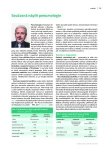-
Medical journals
- Career
Current approach to diagnostics, treatment and prevention of tuberculosis
Authors: Martina Vašáková
Authors‘ workplace: Pneumologická klinika 1. LF UK a Thomayerovy nemocnice, Praha
Published in: Vnitř Lék 2017; 63(11): 815-820
Category: Reviews
Overview
Tuberculosis is world-wide spread infectious disease with persistant high incidence, mainly in the densely populated countries with low income. Czech Republic belongs to the countries with highly efficient control of tuberculosis and continuously decreasing incidence of the disease. High-risk population for tuberculosis in the Czech Republic are the homeless people, who together with migrants from the countries with high incidence of tuberculosis represent reservoir of infection for our population. Treatment of tuberculosis is long-term, combined and controlled. Minimal efficious duration of the treatment is 6 moths. The most severe form of tuberculosis is multidrug-resistant tuberculosis (MDR-TB) caused by the strains resistant to basic antituberculous drugs, i.e. rifampicin and isoniasid, the treatment of which lasts 2–3 years. Preventive measures against tuberculosis comprise BCG vaccination in new-born and treatment of latent tuberculous infection in the individuals with risk of development of tuberculosis. Discovery of new drugs and new vaccine against tuberculosis together with financial and material resources designated for systematic search for the patients with tuberculosis and their treatment in the developing countries may enable continuous decrease of incidence of tuberculosis, whilst we can only dream about its fully erradication.
Key words:
diagnosis – epidemiology – prevention – treatment – tuberculosis
Sources
1. Hershkovitz I, Donoghue HD, Minnikin DE et al. Tuberculosis origin: The Neolitic scenario. Tuberculosis (Edinb) 2015; 95(Suppl 1): S122-S126. Dostupné z DOI: <http://dx.doi.org/10.1016/j.tube.2015.02.021.>.
2. Zatloukal P, Kos S. Tuberkulóza. In: Kolek V et al. Doporučené postupy v pneumologii. Maxdorf: Praha 2013 : 141–163. ISBN 978–80–7345–359–6.
3. Global tuberculosis report 2016. ISBN 9789241565394. Dostupné z WWW: <http://apps.who.int/iris/bitstream/10665/250441/1/9789241565394-eng.pdf?ua=1>. [17.8.2017].
4. Kolek V, Kašák V, Vašáková M et al. Pneumologie. 2.ed. Maxdorf: Praha 2014. ISBN 978–80–7345–387–9.
5. Kolek V et al. Doporučené postupy v pneumologii. Maxdorf: Praha 2013. ISBN 978–80–7345–359–6.
6. Horsburgh CR, Barry CE, Lange C. Treatment of tuberculosis. N Engl J Med 2015; 373(22): 2149–2160. Dostupné z DOI: <http://dx.doi.org/10.1056/NEJMra1413919>.
7. Treatment of tuberculosis guidelines. 4th ed. Geneva: World Health Organization (WHO) 2010. ISBN 978 92 4 154783 3. Dostupné z WWW: <http://apps.who.int/iris/bitstream/10665/44165/1/9789241547833_eng.pdf>.
8. Yew WW, Lange C, Leung CC. Treatment of tuberculosis: update 2010. Eur Resp J 2011; 37(2): 441–462. Dostupné z DOI: <http://dx.doi.org/10.1183/09031936.00033010>.
9. Vašáková M et al. Moderní farmakoterapie v pneumologii. Maxdorf: Praha 2013. ISBN 978–80–7345–351–0.
10. Vašáková M. BCG vakcinace v České republice v podmínkách nové vyhlášky 299/2010 Sb., ze dne 25. 10. 2010. Stud Pneumol Phtiseol 2011; 71(1): 28–30.
11. Daňková D, Trnka L, Švandová E. Projekt přerušení BCG vakcinace novorozenců na vybraném území České republiky. Souhrnná zpráva za roky 1986–1993. Stud Pneumol Phtiseol 1995(4); 55 : 281–292.
12. Homolka J. Biologická léčba preparáty blokujícími účinek TNF alfa. In: Kolek V et al. Doporučené postupy v pneumologii. Maxdorf: Praha 2013 : 167–170. ISBN 978–80–7345–359–6.
13. Polcová V, Vašáková M, Valentová Bartáková L. Tuberkulóza a latentní tuberkulózní infekce u transplantací. In: Kolek V et al. Doporučené postupy v pneumologii. Maxdorf: Praha 2013 : 170–176. ISBN 978–80–7345–359–6.
Labels
Diabetology Endocrinology Internal medicine
Article was published inInternal Medicine

2017 Issue 11-
All articles in this issue
- A targeted search for patients with chronic obstructive pulmonary disease: brief summary
- Asthma bronchiale in the context of internal medicine
- Diagnostics and treatment of community-acquired pneumonia – simplicity is the key to success
- Hospital-acquired pneumonias
- Pneumonia in immunocompromised persons
- Idiopathic pulmonary fibrosis. Can we always diagnose and treat it right?
- Extrinsic allergic alveolitis: minimum for clinical practice
- Sarcoidosis – enigmatic disease still unresolved
- Current approach to diagnostics, treatment and prevention of tuberculosis
-
Non-CF bronchiectasis of adults: short review for clinical practice
Position paper of Board of disease with bronchial obstruction Czech Pulmonological and Phthiseological Society Czech Medical Association of J. E. Purkyne - Cystic fibrosis in adults
- Cardiovascular risk of sleep apnoea and case report
- The complications after lung transplantation
- Non-small cell lung cancer
- Small-cell lung cancer: epidemiology, diagnostics and therapy
- Malign pleural mesothelioma – so far an undefeated tumor
- Spirometry – basic examination of the lung function
- The role of bronchology in pneumological diagnostics
- Ultrasound examination of the chest in the hands of the clinical physician
- Non-invasive ventilation
- Internal Medicine
- Journal archive
- Current issue
- Online only
- About the journal
Most read in this issue- Spirometry – basic examination of the lung function
- Non-invasive ventilation
- Pneumonia in immunocompromised persons
- Small-cell lung cancer: epidemiology, diagnostics and therapy
Login#ADS_BOTTOM_SCRIPTS#Forgotten passwordEnter the email address that you registered with. We will send you instructions on how to set a new password.
- Career

